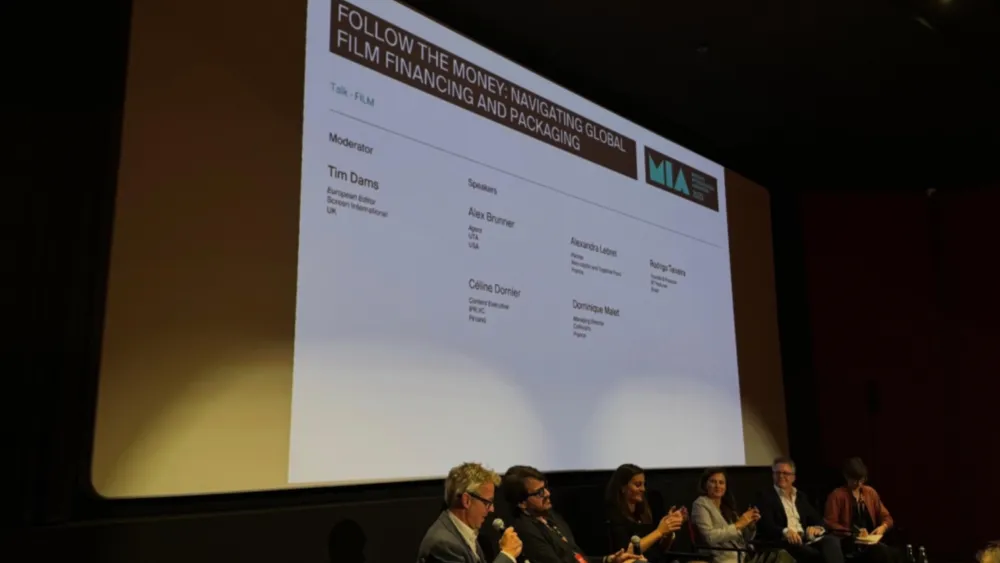
While President Donald Trump might have reupped his threats last month to impose a 100% tariff on movies produced outside the U.S., European film and TV industry professionals aren’t flinching, with triumphant execs taking a victory lap this week at Rome’s MIA Market over the continued one-way traffic of Hollywood production across the pond.
“It’s a very simple question, and the U.S. has understood that: There’s no better place to be when you’re a producer today than in Europe,” said Alexandra Lebret, a partner at French investment firm Axio.
Lebret was speaking at a panel on Wednesday that gathered seasoned fund representatives, agents and producers to talk shop about the fast-evolving world of film financing.
With production costs spiraling worldwide and cost-conscious execs leaving no stone unturned in the hunt for savings, Europe has seen a surge in U.S. production, thanks to a bevy of competitive advantages ranging from tax breaks to soft finance schemes to generally lower production costs across the board.
“It’s great to shoot in Europe,” said veteran producer Rodrigo Texeira, of Brazil’s RT Features (“Call Me By Your Name,” “I’m Still Here”). “American films are coming here because they understand they don’t have those tools you guys have in Europe.”
“We have talents. We have the tax incentives that allow any film or TV series to have a decrease of the cost by 30%. And we also have additional financing,” added Lebret. “It’s crazy. It’s fantastic. That’s why [investment firm Axio] will not go to the U.S. We will wait for the U.S. to come to us.”
Last month President Trump renewed his threats to impose a 100% tariff on movies produced outside the U.S., posting on his Truth Social platform: “Our movie making business has been stolen from the United States of America, by other Countries, just like stealing ‘candy from a baby.’”
Earlier this week in Rome, Italian undersecretary for culture Lucia Borgonzoni blasted the latest threats as “insane,” noting that the proposed levies “would damage the Americans themselves if they imposed them.”
On Wednesday, Texeira expressed the confusion shared by industry professionals across the globe over what a Trump tariff might look like in practice, quipping that the Commander-in-Chief might next try to impose a tax “on [his] shoes.” “No one knows what he means. No one knows what he’s talking about,” said the Brazilian exec.
“He’s taxing his own companies. That makes Europe even better [as an option for U.S. films],” added Lebret.
The ongoing tête-à-tête with the White House highlights the stakes for Hollywood at a time when “costs on everything we consume have gone up,” according to Alex Brunner, a sales agent at UTA.
“The number one thing is to get as much on screen for our clients and try and get them the biggest budget. Cost is not our friend. So we all run around the world, trying to defray those costs…chasing tax credits, subsidies, anything that could reduce that cost factor,” he said. “That’s why we’ve seen — since COVID and the double strikes — an arms race in tax credits. That pursuit is because of the cost factor on these films.”
Despite the optimism around Europe’s upsides as a production base, the panelists agreed that current trends are unsustainable. “The budgets are too high. There is not enough financing to [support] it,” said Lebret. “How do we decrease it? That’s the question we have to answer. It’s a key question for the market in general.”
Last April, Lebret’s firm launched the Together Fund, billed as the first European equity fund dedicated to the support of independent production companies. With an initial capitalization of €58 million ($67 million), the fund was purpose-built to address a gap in the market. “The MGs from international distributors have decreased in films and TV series,” said Lebret. “That’s why there is now a space for equity financing where there was not before.”
When it comes to pre-sales — long a pillar of indie film financing — Brunner said it’s “old news” that the previous model can’t be relied on to provide producers and financiers the security it once offered.
“Now, anything that could pre-sell, it’s become hard. That’s sort of old news,” he said. “And generally, if you go to any market now, there are things that pre-sell like gangbusters, and there are things that you have to wait and see. And we have to pivot when we do that.”
Ahead of next month’s American Film Market, Brunner conceded that the current landscape is “feast or famine” for most films — making it ever more imperative that sales teams put together an air-tight package before taking a project to market.
“We’re all busy trying to package movies together. And as we go through that process, we’re trying to add elements to our screenplays and our filmmakers’ stories that we think have pre-salability,” he said. “We’re being very careful about how we put things together, the price point, what we think that finance will be to really give it a shot.”
Rome’s MIA Market runs Oct. 6 – 10.